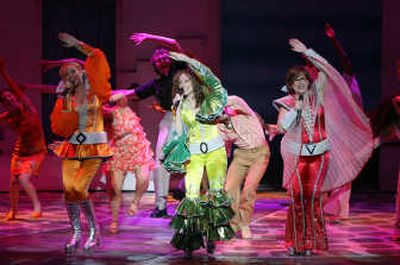ABBA-lutely phenomenal

The verdict on “Mamma Mia!” arrived on April 6, 1999, when the opening night crowd in London jumped up and began dancing in the aisles.
From that moment onward, “Mamma Mia!” was a bona fide phenomenon. In the ensuing years, it has mushroomed into a huge, feel-good smash on Broadway and just about everywhere else. It played in Spokane to huge, happy crowds in 2006, and now it’s back for eight more performances beginning Tuesday.
Yet its success has led to one puzzling question (puzzling to Americans, at least):
ABBA?
How did ABBA, of all the pop groups on earth, spawn a smash musical?
ABBA’s career in the U.S. was, frankly, average. The Swedish quartet of Anni-Frid Lyngstad, Agnetha Faltskog, Benny Andersson and Bjorn Ulvaeus had one Billboard No. 1 hit, “Dancing Queen,” in 1977, and three Top 10 singles, “Waterloo,” “Take a Chance On Me,” and “The Winner Takes All.”
They were popular in the U.S., but no more popular than dozens of other ‘70s and ‘80s pop acts. Their chart performance in the U.S. puts them a little below, for instance, Billy Ocean, who had three No. 1 hits and six Top 10 hits. If you take a look at Billboard’s Top 25 Artists of the 1970s, ABBA is nowhere to be found. Nor do they make Billboard’s Top 100 Artists of All Time.
“The Rolling Stone Record Guide,” circa 1979, called them “prone to induce both sleep and cavities.”
So how, exactly, did an ABBA musical take the world by storm?
The clue is in the word “world.”
If ABBA were only a medium-sized phenomenon in America, they were a nearly Beatles-sized phenomenon in Europe – and just about everywhere except America. They burst on to the scene in 1974 by winning the Eurovision Song Contest (the equivalent of winning “American Idol”). Then they proceeded to have a ridiculous string of European hits.
In Ireland, they had 13 No. 1 songs. In Belgium, they had seven consecutive No. 1 albums. In England and the U.K., they had a run of Top 10 singles surpassed only by Elvis, the Beatles and the Stones.
As of today, they have sold 350 million records worldwide and are the U.K.’s No. 8 best-selling pop act of all time, one place higher than Paul McCartney.
So when “Mamma Mia!” opened in London’s West End in 1999, it was an event of almost McCartney-like proportions. The crowd knew every song. Sellout followed sellout. “Mamma Mia!” embarked on a massive European tour, which drew millions.
Yet in late 2000, the producers were still nervous about the U.S. market.
“We were warned that America was not so familiar with ABBA’s music,” wrote producer Judy Craymer. “We were cautious. Broadway was still a dream away.”
Turned out, they had nothing to worry about. When “Mamma Mia!” opened in Broadway’s Winter Garden Theatre in October 2001, it had the highest advance sales in the theater’s history. More than six years later, the Broadway production is still packing them in. Another resident company has been playing Las Vegas since 2003.
So now, we’re back to a variation on that first question: ABBA? How did ABBA sweep America, too?
For one thing, you don’t need to be familiar with the entire ABBA back-catalog to enjoy this cheerful musical version of chick-lit. Its story incorporates young love, old love, weddings, Greek islands and mother-daughter relationships. Also, ABBA’s songs are particularly well-suited to musical theater, because many of them are mini romantic-comedies in themselves. When it comes to storytelling, ABBA’s songs are better than the average pop song.
For another, ABBA may not have been as big as Donna Summer in America, but they weren’t exactly unknown. We all have at least a few ABBA hooks from the 1970s imbedded permanently in our brains. When the characters launch in to “Dancing Queen,” even Americans feel that pure 1970s synthesizer-pop nostalgia.
The show is now in its ninth year in London and shows no signs of stopping. There are 15 productions now playing around the world, including the North American Tour, which arrives at the INB on Tuesday. A movie version, starring Meryl Streep, Colin Firth and Pierce Brosnan, arrives this summer.
Meanwhile, here’s the show’s true triumph: It put “ABBA Gold,” the greatest hits collection, back on the Billboard charts. ABBA’s music finally conquered America, 25 years later.